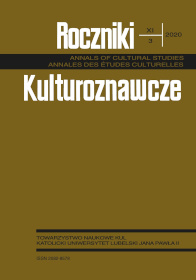Epidemic and the Individual: Renaissance Understandings of the Plague in View of Modern Experiences
Abstract
Epidemics are a challenge to individualism. While we tend to think of illnesses in terms of personal suffering and choices, plagues affect communities and societies over long times. Epidemics turn the perspective to the collective, the transcendent, and the external, and fear, therapy and care become universal, rather than individual. These are the lessons we can gather from Renaissance philosophers’ theories of epidemics. Marsilio Ficino (1433–1499) gave “Advice against the pestilence” by emphasizing the harmony of body with the environment (air and the planets). Girolamo Fracastoro (1477–1553) produced the first description of “Syphilis,” both scientifically and poetically. He invented the name for that contagion. He saw sexual activity as one of the typical behaviors among fellow humans. Care for one’s health requires respect for the others; and blaming others (as in ‘French disease’) is useless. Jean Fernel (1497–1558) called for strictly medical research into epidemics; at the same time, he acknowledged the insufficiency of data; hence the title of his book De abditis rerum causis (“The hidden causes”). Thus, he explained the irrational behavior of populations and some scholars. The task is to live with uncertainty and to contain epidemics by containing the unknown.
References
Agricola, Georg. De peste libri tres. Basel: Froben, 1554.
Beecher, Donald. “Ficino, Theriaca and the Stars.” In Marsilio Ficino: His Theology, His Philosophy, His Legacy, edited by Michael J. B. Allen, Valery Rees, and Martin Davies, 243–56. Leiden: Brill, 2001.
Beiweis, Susanne. “Saturn und Talisman: Die heterogenen Begriffe der Magie am Beispiel von Marsilio Ficinos ‘De vita libri tres.’” Phil. Diss., Wien, 2015.
Beiweis, Susanne K. “‘Naturam Ars Imitatur’: Magical Images within Marsilio Ficino’s De Vita Libri Tres.” Verbum — Analecta Neolatina 19, no. 1–2 (2018): 155–80. http://www.verbum-analectaneolatina.hu/en_issue.php?issue=XIX/2018/1-2.
Blum, Paul Richard. “Qualitas occulta.” In Historisches Wörterbuch der Philosophie, 7:1743–47. Basel: Schwabe, 1989.
“Covid-19 und die PhilosophInnen. Eine Übersicht über die mediale Präsenz der Philosophie.” Information Philosophie, no. 2 (2020): 16–25.
Fernel, Jean. On the Hidden Causes of Things. Translated by John M. Forrester. [De abditis rerum causis, Lat.-Engl.], edited by John Henry and John M. Forrester. Leiden: Brill, 2005.
Ficino, Marsilio. Consilio contro la pestilenzia, edited by Enrico Musacchio. Bologna: Cappelli, 1983.
Ficino, Marsilio. Three Books on Life, edited by Carol V. Kaske and John R. Clark. Binghamton, NY: Medieval & Renaissance Texts & Studies, 1989.
Fracastorius, Hironymus. “De contagionibus et contagiosis morbis et eorum curatione.” In Opera omnia, 77r–110v. Venetiis: Iunta, 1584.
Fracastoro, Girolamo. “Syphilis sive de morbo gallico.” In Latin poetry. Translated by James Gardner, 1–85. Cambridge, MA: The I Tatti Renaissance Library, Harvard University Press, 2013.
Frischmann, Bärbel. “Das Virus und die Angst.” Information Philosophie, no. 2 (2020): 8–15.
Ginzburg, Carlo. “Une démocratie grégaire?” En attendant Nadeau (blog), July 11, 2020. https:// www.en-attendant-nadeau.fr/2020/07/12/democratie-gregaire-ginzburg/.
Herrmann, Sabine. Tomaso Rangone: Arzt, Astrologe und Mäzen im Italien der Renaissance. Göttingen: Vandenhoeck & Ruprecht, 2017.
Hirai, Hiro. “Ficin, Fernel et Fracastor autour du concept de semence: Aspects platoniciens de seminaria.” In Girolamo Fracastoro fra medicina, filosofia e scienze della natura: Atti del convegno internazionale di studi in occasione del 450. anniversario della morte, Verona-Padova 9-11 ottobre 2003, edited by Alessandro Pastore and Enrico Peruzzi, 245–60. Firenze: Olschki, 2006.
Hirai, Hiro. Medical Humanism and Natural Philosophy: Renaissance Debates on Matter, Life and the Soul. Leiden: Brill, 2011.
Hirai, Hiro. “The New Astral Medicine.” In A Companion to Astrology in the Renaissance, edited by Brendan Dooley, 267–86. Leiden: Brill, 2014.
Iommi Echeverría, Virginia. “Girolamo Fracastoro y la invención de la sífilis.” História, Ciências, Saúde-Manguinhos 17, no. 4 (December 2010): 877–84. DOI: https://doi.org/10.1590/S0104-59702010000400002.
Katinis, Teodoro. “A Humanist Confronts the Plague: Ficino’s Consilio Contro La Pestilentia.” Modern Language Notes 125, no. 1 (2010): 72–83.
Katinis, Teodoro. Medicina e filosofia in Marsilio Ficino: Il Consilio contro la pestilenza. Roma: Edizioni di Storia e Letteratura, 2007.
Kohn, George Childs. Encyclopedia of Plague and Pestilence. 3rd edition. New York: Facts On File, 2008.
Monreal, Ruth. “Eppur lo dice! Come si trasmette la sifilide nel poema didattico di Girolamo Fracastoro.” Studi Umanistici Piceni 23 (2003): 179–89.
Müller-Jahncke, Wolf-Dieter. Astrologisch-magische Theorie und Praxis in der Heilkunde der frühen Neuzeit. Sudhoffs Archiv, Beiheft 25. Stuttgart: Steiner, 1985.
Palmer, Ada. “Black Death, COVID, and Why We Keep Telling the Myth of a Renaissance Golden Age and Bad Middle Ages.” Ex Urbe. History, Philosophy, Books, Food & Fandom. Accessed July 14, 2020. https://www.exurbe.com/black-death-covid-and-why-we-keep-telling-the-myth-of-a-renaissance-golden-age-and-bad-middle-ages/.
Pastore, Alessandro, and Enrico Peruzzi (eds.). Girolamo Fracastoro fra medicina, filosofia e scienze della natura: Atti del convegno internazionale di studi in occasione del 450. anniversario della morte, Verona-Padova 9-11 ottobre 2003. Firenze: Olschki, 2006.





